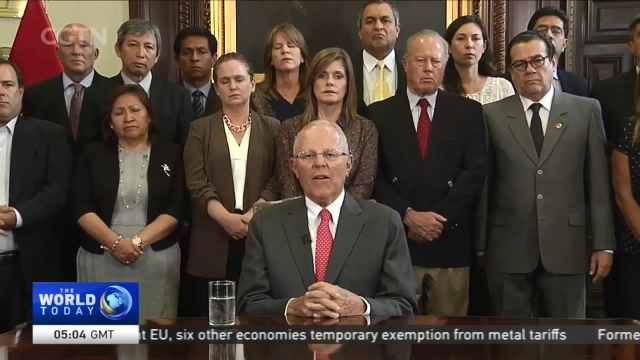
15:09, 23-Mar-2018
President of Peru Resigns: Will congress accept resignation or proceed with impeachment vote?

The day after Peru's president offered his resignation amid allegations of corruption, the country is still waiting to see what happens next. As CGTN's Dan Collyns reports - it's now up to Congress to make the next move. He has the latest from Lima.
The day after the president's resignation-Many in Peru are wondering what happens next. The country's Congress must decide whether to accept Pedro Pablo Kuczynski's resignation or proceed with a scheduled impeachment vote.
VICTOR ANDRES GARCIA BELAUNDE CONGRESSMAN, POPULAR ACTION PARTY "I think we should accept the president's resignation. We should not reject it to then remove him. I think it would be absurd to do that."
While many back accepting the resignation to ensure a smooth transition of power. Other parties are calling for Kuczynski to be forced out for alleged corruption in his ties to disgraced Brazilian construction giant Odebrecht.
VERONIKA MENDOZA NUEVO PERU PARTY "If Kuczysnki goes, it is because he's corrupt and immoral and that should be clear for the whole of Peru."
Kuczynski defiantly denied any wrongdoing in his resignation message and dismissed the secretly-recorded videos released by the political opposition which appear to show government figures attempting to buy votes.
DAN COLLYNS LIMA "Such a rapid descent into political uncertainty is clearly not a good development for Peru, or the region. The encouraging news is that as the country emerges from the crisis, the economic outlook should improve. Many questions remain, however, about the immediate impact."
Martin Vizcarra, the first vice president, is likely to take over, preventing the need for fresh elections. But some analysts don't see the new government as a long term option.
FERNANDO TUESTA FORMER HEAD OF PERU'S ELECTORAL BOARD "I would think it could work for a transitional government but I'm not sure it could manage three and half years."
Who will be running the country come 2021 -- when Kuczynski's term was due to end -- is still far from clear. Dan Collyns, CGTN, Lima.

SITEMAP
Copyright © 2018 CGTN. Beijing ICP prepared NO.16065310-3
Copyright © 2018 CGTN. Beijing ICP prepared NO.16065310-3